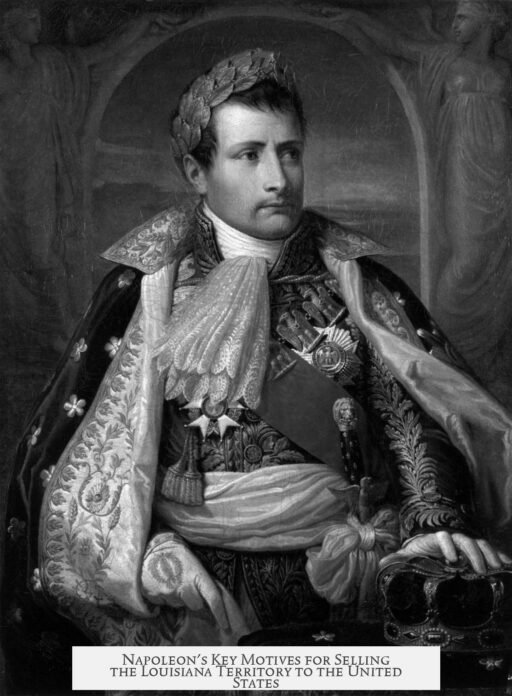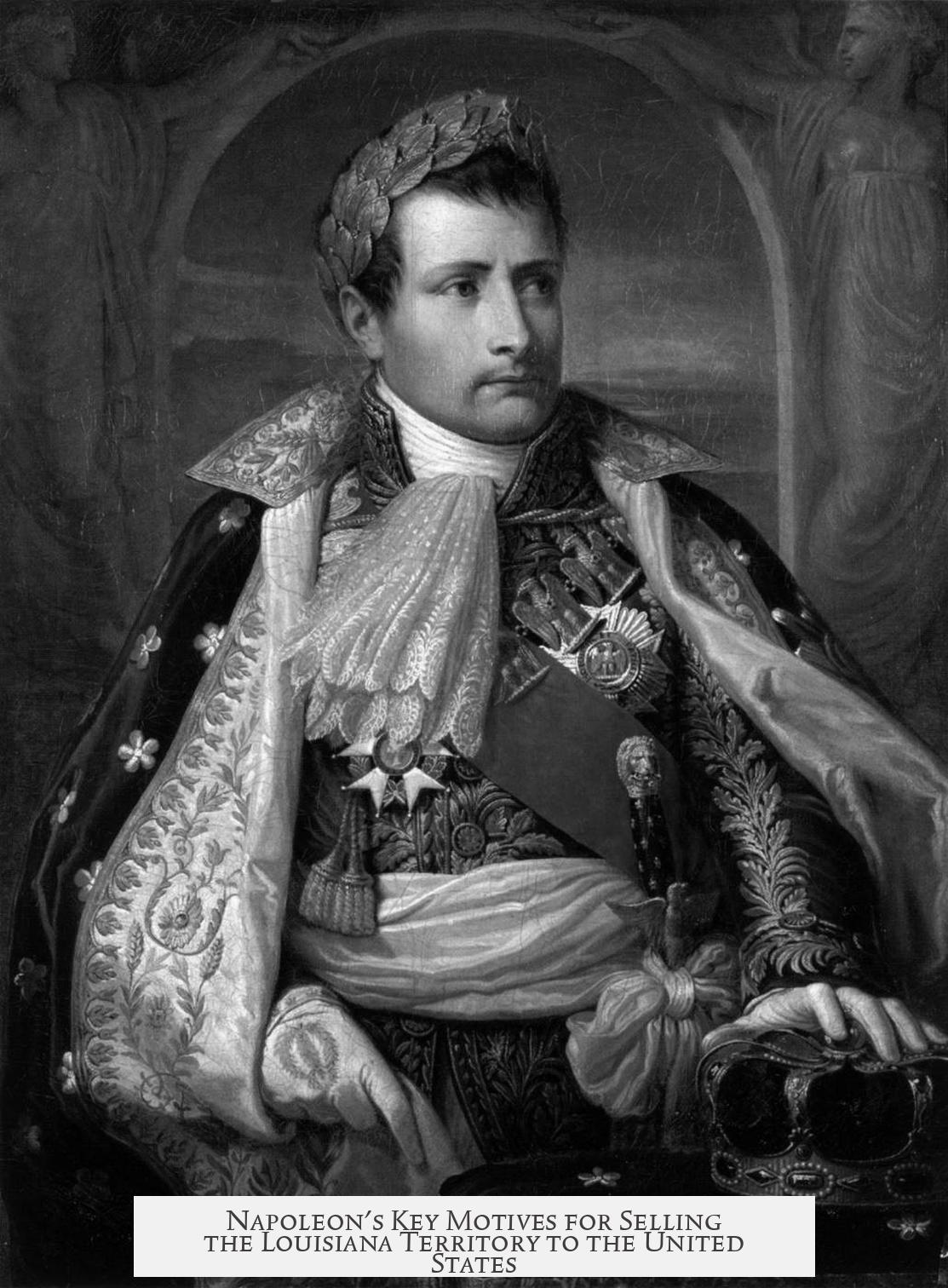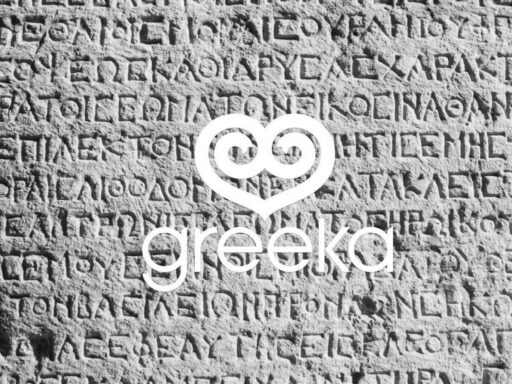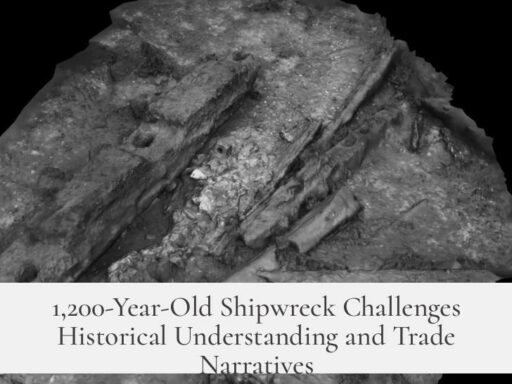Napoleon’s motives behind selling the Louisiana Territory to the U.S. were primarily financial, strategic, and practical. He needed quick funds to support ongoing wars in Europe, could not defend the vast and distant territory, suffered a debilitating loss in Haiti that eliminated a key base, and sought to counter British influence by empowering the United States as a rival power.
At the time of the Louisiana Purchase in 1803, Napoleon Bonaparte faced severe financial pressure. Europe was embroiled in conflict, particularly against Great Britain. France required substantial funds to maintain and expand its military efforts. The Louisiana Territory was far from France, sparsely populated and difficult to manage or profit from quickly. Instead of investing years and resources to develop the territory, Napoleon chose to convert it into immediate cash. The U.S. was willing to pay $15 million, a deal that provided France critical funds to finance its European campaigns. Essentially, the sale was a pragmatic financial decision to fund France’s military needs.
Administering the Louisiana Territory presented major logistical and defensive challenges. The land was thousands of miles from Paris, bordered by a neutral Spain, an expanding United States, and a combative British Empire. France lacked the naval strength to control the Mississippi River’s mouth after losing Haiti, and holding the territory against encroachment seemed unlikely. Napoleon recognized that defending such a vast area was impractical. Selling the land preemptively was wiser than risking loss by force or illegitimate occupation, especially since American settlers were already eyeing the region.
The loss of Haiti critically influenced Napoleon’s decision. Haiti, France’s richest colony, suffered a brutal slave rebellion that ended French control in 1803. For Napoleon, Haiti was a pivotal naval base and economic asset that complemented Louisiana. Without Haiti, Louisiana became far less valuable strategically and economically. The failure to regain Haiti meant France could not sustain its ambitions in the Americas. Louisiana was intended to supply and support Haiti, so once Haiti was lost, Louisiana’s strategic purpose collapsed. Holding Louisiana without a Caribbean stronghold was untenable, prompting its sale to the U.S.
Another crucial motive was to hinder British expansion. Britain was France’s main rival. By selling the territory to the U.S., France prevented Britain from seizing it. The transaction empowered the United States, creating a future continental rival to Britain. Napoleon reportedly acknowledged he had strengthened a maritime competitor that could challenge British dominance. The sale acted as a strategic blow to British power without direct conflict, as Britain risked war with both France and the U.S. if it sought to acquire Louisiana by force. Thus, the purchase was a diplomatic tactic to curb British expansion across North America.
Napoleon’s decision blended short-term needs and long-term strategy. Financial desperation fueled by European wars, combined with military infeasibility and geographic realities, forced him to abandon territorial ambitions in North America. Meanwhile, strengthening the U.S. served as an indirect means to counterbalance Britain’s power globally.
| Motive | Details |
|---|---|
| Financial Needs for Wars | Sold territory to raise money for European conflicts, especially against Britain. |
| Inability to Defend | Distance and hostile neighbors made Louisiana hard to control or protect militarily. |
| Loss of Haiti | Haitian Revolution deprived France of a key base, making Louisiana less viable. |
| Counter British Expansion | Sale empowered the US as a rival to Britain, limiting British territorial ambitions. |
The Louisiana Purchase transformed the U.S., doubling its land size and securing control of the Mississippi. For France, it was a pragmatic move driven by immediate needs and strategic calculations. Napoleon set aside imperial dreams in America to focus on Europe where his power was most contested.
- Napoleon sold Louisiana mainly to fund wars in Europe.
- The territory was distant, costly to maintain, and vulnerable to attack.
- The loss of Haiti eliminated France’s key base supporting Louisiana.
- Selling to the U.S. blocked British expansion westward.
- The sale created a future U.S. rival to Britain, indirectly benefiting France.
What Were Napoleon’s Motives Behind Selling the Louisiana Territory to the U.S.?
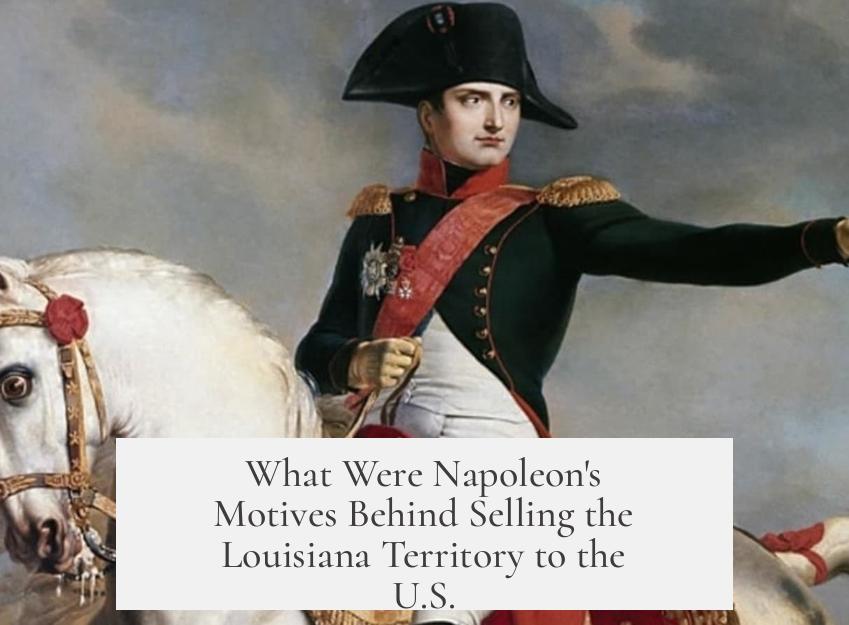
Napoleon’s motives for selling the Louisiana Territory to the United States boil down to a mix of financial desperation, strategic practicality, and clever geopolitical maneuvering. Far from a simple land deal, the Louisiana Purchase reflects Napoleon’s pressing need for cash, the changing realities of empire, and a clever move to keep his bitter enemy, Great Britain, at bay.
Let’s break down why Napoleon decided to let go of such a vast chunk of land that covered around 828,000 square miles. It’s a story filled with war, rebellion, and a dash of political brilliance.
Money, Money, Money: Financing European Wars
First and foremost, Napoleon was broke. Really broke. You see, maintaining and defending overseas territories costs a fortune, especially one as vast and underdeveloped as the Louisiana Territory.
Imagine trying to run a business from across the ocean where the “customers” are sparse and the “store” is empty lands. The territory was mostly wilderness and wouldn’t turn profits anytime soon. It required massive resources and years, maybe decades, of investment before anything significant could be gained.
Napoleon needed cash—quickly—to fund his military campaigns back in Europe, especially to wage war against Great Britain, France’s eternal nemesis. It’s like having a gas tank on empty while trying to outrun a speeding car.
So, instead of sinking money into a remote and expensive colony, Napoleon saw a better deal: sell it to the eager United States, get cold hard cash, and funnel that money into the defense and expansion of France in Europe.
He was desperate for money, plain and simple. And the Americans were more than happy to oblige. The $15 million they paid was an absolute steal for them but a vital injection of funds for Napoleon’s needy war chest.
Distance and Defense: A Threat Far Too Hard to Hold
It’s one thing to buy land; it’s another to defend it. Napoleon understood this very well. The Louisiana Territory was not just empty—it was a challenging and precarious position to maintain.
France was stretched thin, embroiled in battles across Europe. The territory was thousands of miles away, near hostile or neutral neighbors—Spain, the United States, and aggressive Britain.
Napoleon knew he couldn’t protect Louisiana effectively. Holding onto territory you can’t defend is a bit like locking your front door but leaving the windows open—eventual loss is all but guaranteed.
He didn’t want to lose the Louisiana Territory to American settlers or British forces in a scramble later. So he chose to sell it first rather than have it taken away. It was a practical, if somewhat reluctant, decision to “cash out” before losing everything for nothing.
The Haitian Revolution: The Game Changer
Here’s where it gets juicy. Haiti, or Saint-Domingue as it was known, was France’s crown jewel in the Americas—a wealthy sugar colony critical for French colonial ambitions.
But between 1791 and 1804, Haiti experienced a massive and violent slave rebellion—the Haitian Revolution—which ousted the French. This defeat devastated Napoleon’s plans. Losing Haiti meant losing the crucial naval base and supply point needed to sustain power and presence in the New World.
Without Haiti, Louisiana’s strategic value plummeted. It was meant to support and protect France’s Caribbean empire. Once that empire crumbled, Louisiana was little more than an expensive liability.
Napoleon’s grand dream of building a French colonial empire in America was effectively over. And yes, the brutal realities of slavery-based economies in Louisiana made the prospect even less appealing in a world now unsettled by revolution.
Outwitting Britain: A Future Rival and a Middle Finger
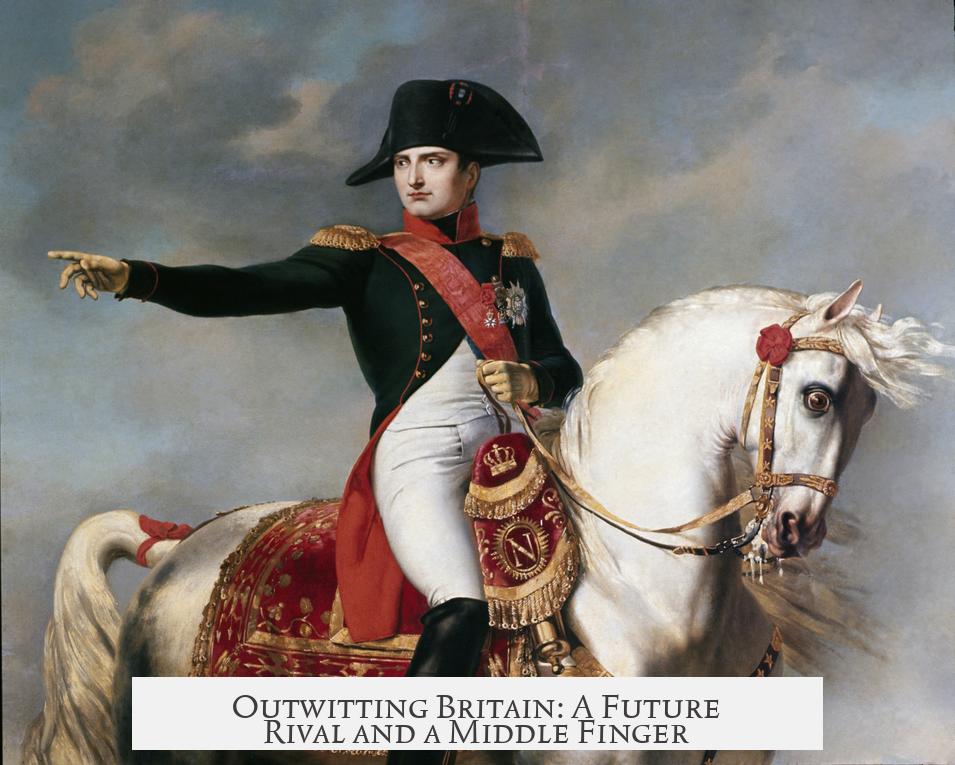
Napoleon wasn’t just thinking about today; he was playing a long game. Selling Louisiana to the U.S. was a strategic move to prevent Britain from expanding westward into French-held territories.
If Britain had taken Louisiana, it would have strengthened their dominance in North America dramatically. Instead, by empowering a rising power—the United States—Napoleon was planting a potential rival for Britain on the continent.
Think of it this way: selling Louisiana was Napoleon’s way of saying, “Here, you deal with this problem.” He helped create a maritime and continental rival that could challenge British supremacy eventually.
Napoleon once said, “I have just given to Britain a maritime rival that will sooner or later humble her pride.” So, beyond cash and defense, the sale was a calculated geopolitical jab at Britain.
Summary: Napoleon’s Motivations Told as a Story
Imagine Napoleon in 1803, standing in his war room, pencils and maps sprawled across the table. His empire in Europe demands money and manpower. His prized colony, Haiti, lies lost in flames of rebellion. Behind the Atlantic lies a vast territory, rich in soil but poor in immediate value.
Meanwhile, Britain’s navy prowls the seas, ready to snatch anything France cannot hold. How does Napoleon respond?
- He sells. Quick cash for Louisiana feeds his European wars.
- He cuts losses, knowing defense is a losing game so far from home.
- He relinquishes a colony that lost its strategic backbone with Haiti’s fall.
- He cleverly arms the U.S. as a new power to annoy Britain.
This sale wasn’t defeat—it was pragmatism painted with grand strategy. It let Napoleon focus on the European battlefield while indirectly sowing seeds for a future rival to the British Empire.
What Can We Learn from Napoleon’s Louisiana Sale?
First: sometimes, letting go is the smartest move when holding on risks everything. Napoleon knew he could not afford to squander resources on a distant land.
Second: power isn’t just about land. It’s about money, logistics, and knowing your limits.
Third: strategic alliances and rivalries can be crafted through unexpected means. Selling land to a young America not only filled coffers but set the stage for future geopolitical shifts that changed the course of history.
So, next time you wonder why Napoleon parted ways with a massive peace of America, think about the debts he had to pay, the threats he wanted to outsmart, and the empire he struggled to protect against overwhelming odds.
In the end, Napoleon’s Louisiana sale is less about losing land, more about buying time—and that’s a lesson in leadership and strategy even now.
